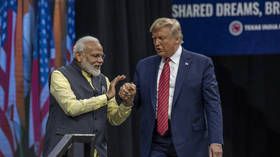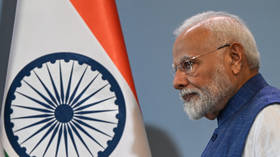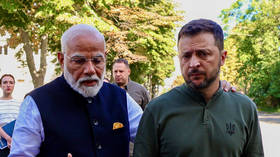Emotional, transactional, ideological: What India gains from Trump’s comeback
New Delhi hopes that the president-elect will ease pressure over allegations of targeting Khalistan separatists living in the US and Canada, as well as its ties with Russia
Donald Trump’s election victory on Tuesday night became a celebratory event in India. The ecstatic mood reflected in the media has no parallel in living memory. Sadhus and priests in Delhi performed a ‘hawan’ (worship) to pray for Trump’s victory. A prominent priest applied vermillion to photos of the former US president and allies Elon Musk, Robert F. Kennedy Jr., and Vivek Ramaswamy. The poster included the words ‘Vote for Donald Trump to save Hindus’. The video has gone viral on social media.
The US and India have a transactional relationship. This is a rare moment when it percolated down to the people-to-people level – somewhat surreal, actually.
Prominent politician and intellectual Yogendra Yadav wrote in a national daily that US elections are “like a wedding in the big landlord’s family in our village. It makes for a spectacle.”
However, he cautioned: “As affairs of powerful families do, it [the US election] has some fallouts for everyone, including us. But as village elders know, we must not forget that this is not a wedding in our family… the US is not even our neighbour. Our proximity to them is largely imagined… We are an outsider in the wedding. An inconsequential outsider. And that’s not a bad position to be in.”
Prime Minister Narendra Modi himself led the way in a post on X when the first tidings from America reached him, expressing his “heartiest congratulations” to his “friend” Donald Trump. “As you build on the successes of your previous term, I look forward to renewing our collaboration to further strengthen the India-US Comprehensive Global and Strategic Partnership. Together, let’s work for the betterment of our people and to promote global peace, stability and prosperity.”
Modi followed up with a phone call to Trump, reiterating that he looks forward to “working closely together once again to further strengthen India-US relations across technology, defense, energy, space, and several other sectors.”
Notably, the core constituency of the ruling Bharatiya Janata Party (BJP) has come to believe that Trump is ‘pro-Hindu’. It is a different matter, though, that this extraordinary politician who is so large and powerful that he lives by his own set of rules, is at best an agnostic who has convinced the evangelicals in America (over one-third of Americans who affirm traditional Protestant teachings on the authority of the Bible) and the Zionists in Israel – and now, the Hindus in India – that he is their protector.
India’s official stance is that relations with Washington have steadily progressed during the tenures of US President Joe Biden and his four predecessors, including Trump. External Affairs Minister Subrahmanyam Jaishankar said as recently as November 5: “we have actually seen steady progress in our relationship with the US over the last five presidencies. Including an earlier Trump presidency. So, when we look at the American election… we are very confident that whatever the verdict, our relationship with the United States will only grow.”
The government kept its cards close to its chest given the expected tight race between current VP Kamala Harris and Trump. Once bitten, twice shy. At a massive political-cultural rally in Houston in 2019, with Trump by his side, Modi erred seriously while trying to persuade the Indian-American community that the US president was a good bet for a second term. This time around, however, Modi didn’t risk the wrath of the Democrats.
In September, he had a change of mind about meeting with Trump. Suffice to say, for a second time, New Delhi erred in reading the tea leaves.
The government is betting that Trump will snuff out the highly embarrassing allegations by Ottawa and Washington that New Delhi plotted to kill Khalistan separatists living in the US and Canada. Indeed, Trump wouldn’t be interested at all in a witch hunt of the Indian leadership. Ottawa and the Five Eyes (Australia, Canada, New Zealand, the US, and UK) concluded that the plot went to the uppermost echelons of the Indian leadership, and Canadian Prime Minister Justin Trudeau has become a thorn in the side of the Indian government.
However, Trump has a poor opinion of Trudeau and will gladly throw him under the bus. (Trump had a public spat with Trudeau during the controversial G7 summit in Quebec in 2018, from which he abruptly walked out, refusing to put his signature on the final declaration.)
The bottom line, nonetheless, is that the US-Indian tango will have gravitas during the Trump presidency going forward. The bedrock of shared interests includes China’s rise, defense partnership, technology, and economic ties. Equally, Trump may not make such a big fuss (as the Biden administration is doing) over India’s relations with Russia or Modi’s warm relations with President Vladimir Putin. Trump may even calm tensions with Moscow and turn his back on the proxy war in Ukraine.
The ‘known unknown’ is how Trump uses the short time of four years to boost his MAGA movement. Trump’s first term is nothing to go by, since he was new to the ‘swamp’ in DC, and the Deep State entrapped him in the quagmire of ‘Russian collusion’.
Who is the real Trump? We are yet to find out. The choice of J.D. Vance as his vice president gives some clues. But Trump is certainly a wiser and more experienced politician today than he was in his first term.
Be that as it may, Jaishankar is right that New Delhi is experienced enough by now to handle idiosyncratic American presidents and cut to the chase. On the whole, therefore, the sense of euphoria in New Delhi is understandable. Suffice to say, the consolidation of relations with Russia in recent years and a potential thaw on the horizon in Sino-Indian ties puts India in a comfortable position today in regional and world politics.
Cynics might say a friend to all is a friend to none. But as the 20th century British writer C.S. Lewis once said, “Friendship is unnecessary, like philosophy, like art… It has no survival value; rather it is one of those things that give value to survival.”
At any rate, India’s doctrine of multi-alignment in the present transformative period in the world order has nothing to do with airy friendships but is a purposive pursuit of interests in an unpredictable external environment.
Trump and Modi are pragmatic and independent deal makers. Both prioritize real interests ahead of liberal or neoconservative ideological interests. To grasp the ideas shaping the Trump administration, one has to understand its three pillars of populism, authoritarianism, and nativism. His impressive mandate bears this out.
Nativism may seem an almost exclusive American concept which favors native inhabitants as opposed to immigrants. But nativism in India also arose in a natural place: A nation constructed through waves of invasion and backlashes to invasion, where the meaning of ‘native’ is always evolving.
In the Indian context, however, the phenomenon of nativism is also a view on how a state should be structured. It is an ideology that seeks congruence of state and nation, that is, the political and cultural unit – one state for every nation and one nation for every state. Modi’s nativism outstrips Trump’s.
The statements, views and opinions expressed in this column are solely those of the author and do not necessarily represent those of RT.








Comments are closed.